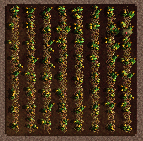Farms: Difference between revisions
No edit summary Tag: Reverted |
No edit summary Tag: Manual revert |
||
| Line 1: | Line 1: | ||
[[File:farm_preview.png|right]]'''Farms''' are [[agriculture]] structures that allow the player to grow their own crops for their [[settlement]]. Farms must be managed by [[citizens]]. The bigger the farm, the more product/[[food]] it can produce, but will require more people to manage. The player must have the seeds/resource first to be able to make certain types of farms. For example, if the player has no [[vegetables]], they won't be able to make a vegetable farm, but if the player found vegetables in the wild, then they would then be able to make such a farm, as the player would then have the seeds to do so. | [[File:farm_preview.png|right]]'''Farms''' are [[agriculture]] structures that allow the player to grow their own crops for their [[settlement]]. Farms must be managed by [[citizens]]. The bigger the farm, the more product/[[food]] it can produce, but will require more people to manage. The player must have the seeds/resource first to be able to make certain types of farms. For example, if the player has no [[vegetables]], they won't be able to make a vegetable farm, but if the player found vegetables in the wild, then they would then be able to make such a farm, as the player would then have the seeds to do so. | ||
Revision as of 18:29, 17 November 2021

Farms are agriculture structures that allow the player to grow their own crops for their settlement. Farms must be managed by citizens. The bigger the farm, the more product/food it can produce, but will require more people to manage. The player must have the seeds/resource first to be able to make certain types of farms. For example, if the player has no vegetables, they won't be able to make a vegetable farm, but if the player found vegetables in the wild, then they would then be able to make such a farm, as the player would then have the seeds to do so.
The efficiency of the farm depends on the fertility of the soil the player builds it on. Another statistic of farms is irrigation, which can be increased if there is water in the tiles right next to it. Irrigation increases how much product a farm can give. This also means that if the water is surrounding all or most tiles of a farm, the farm will receive the maximum amount of help the water could provide. Rain will also help farms.
Using the Dig Canal command near farms is a very easy way to increase a farm's fertility and production. Though farms can be used forever, they produce crops very slowly, as they can only yield crops once per year, so it is advised to combat this by making farms larger and/or more of them, though larger farms will require more citizens to be worked efficiently. The climate chosen for the player's settlement dictates which farms are available.
There are six types of farms and fisheries are included due to their close relationship to fish farms: Cotton Farms, Fruit Farms, Grain Farms, Mushroom Farms, Opiate Farms, Vegetable Farms and Fisheries. If a settlement is in a temperate or warm climate, farms will receive a +5% or +10% bonus, respectively.
With the use of knowledge points, the output of farms can be increased. The maximum percentage of increased output for all farms is 20%. It's 22% for mushroom farms.